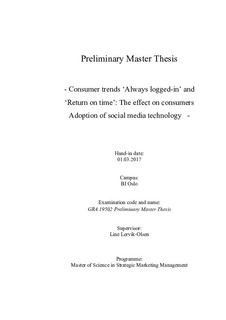| dc.description.abstract | Adoption of new technologies have been of importance for researchers for a long
time, and constructs are continuously being analyzed to better understand what
makes consumers more likely to adopt. The use of social media technologies are
still increasing, and consumers adopt and use more platforms simultaneously now
than before. This paper seeks to provide new content to the literature of social media
technology, by looking at how different construct affect consumer’s intention to
adopt new social media technologies. Being Always logged-in (ALI), wanting to
achieve Return on Time (RoT) and having the Fear of Missing Out (FoMO) are
phenomena in the marketing literature, which explains consumer behavior and their
needs. This paper analyzes how these three phenomena influence the adoption of
new social media technologies. It is also important to identify drivers that leads to
consumers being always logged in on social media. To better understand the
construct of ALI, the paper seeks to identify how Habits, FoMO and three different
dimensions of Nudging, including Nudge Hygiene Factor, Motivational Nudges
and Social Nudges influence ALI.
To fully understand how these construct influence each other, it is necessary to
establish a model that both includes the drivers of ALI and the phenomena
influencing Adoption. Our study is based on a qualitative research, where a survey
is conducted, making it possible to empirically test the results.
The findings show that ALI, RoT and FoMO have a positive effect on Adoption of
social media technology, meaning the phenomena does lead to increased likelihood
of adoption. Habits positively influence ALI, which indicates that consumers using
social media automatically are more likely to be always logged in. Having fear of
missing out gave us opposite results, and does not lead to being always logged in
on social media. The different dimensions of Nudging show that Nudge Hygiene
Factor and Motivational Nudges have a positive effect on ALI, while Social Nudges
does not. This indicates that people are influenced by their own motivation rather
than significant others when it comes to using and reacting to nudges on social
media. | nb_NO |

